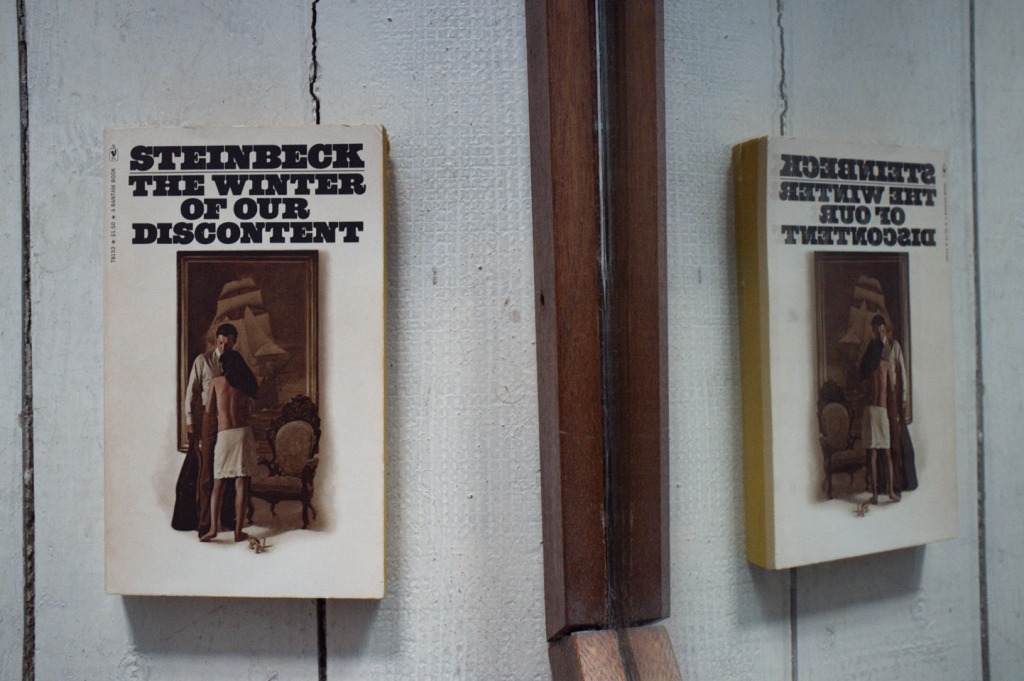Published in 1961, The Winter of Our Discontent was John Steinbeck‘s last novel. I came across this 1975 copy at Nijinski, my favourite secondhand bookstore in Brussels.
I had not read Steinbeck previously but the title caught my eye. The cheesy book cover – of a man, standing in front of a dramatic painting of a ship at sea, with his hand around the bare waist of a woman in a petticoat – nearly made me put the book back on the shelf. I’m glad I managed to look past this.
And no, I didn’t know that the title of this novel is a reference to Shakespeare’s Richard III (1594): “Now is the winter of our discontent. Made glorious summer by this sun of York.”
The protagonist, Ethan Allen Hawley, is the descendant of a family of whalers (and pirates, it seems) in a small town in the East Coast. He is working for an Italian immigrant in a grocery store that stands in a block of buildings that used to belong to the Hawleys, before the family fortune was lost in recent generations.
As it is soon revealed in the book, all is not well. There’s something brewing under the surface. Societal pressure, especially that imposed upon him by his family, cracks the honest, friendly and dependable facade of the protagonist as Hawley struggles with his inner conflicts.
Plots emerge with the interplay of relationships and cards (be it tarot or emotional), pitting one against another – friendship versus greed, trust against cunning, despair against ambition.
The story is an emotional roller-coaster with a few unexpected turns as Hawley unveils (or should it be ‘discovers’?) another side of himself. Ethan’s observation following an encounter with the town’s vixen – “I wonder how many people I’ve looked at all my life and never seen” – is certainly how others must have thought about him.
In The Winter of Our Discontent, Steinbeck depicts what he saw as the decay of moral values in post-war America in the mid-twentieth century. There’s greed, betrayal, disillusion, desperation, doubt, sacrifice, love, trust, envy, desire, laziness, devotion, and of course, discontent. The good and the bad, but really, more of the latter.
The novel raises several questions on morality and existence. I’ve interspersed some quotes from the books in between the questions that came to mind.
How far does one go and is willing to compromise one’s values for money and status? What is right and what is wrong?
“A man who tells secrets or stories must think of who is hearing or reading, for a story has as many versions as it has readers. Everyone takes what he wants or can from it and thus changes it to his measure. Some pick out parts and reject the rest, some strain the story through their mesh of prejudice, some paint it with their own delight.”
When is a crime not one? Can one justify a wrongdoing?
“Strength and success – they are above morality, above criticism. It seems, then, that it is not what you do, but how you do it and what you call it. Is there a check in men, deep in them, that stops or punishes? There doesn’t seem to be. The only punishment is for failure. In effect no crime is committed unless a criminal is caught.”
Is money really a mean to an end?
“In poverty she is envious. In riches she may be a snob. Money does not change the sickness, only the symptoms”
The poignant ending came swiftly in brief chapters. It rather made me hold my breath.
“I wonder about people who say they haven’t time to think…Maybe not having time to think is not having the wish to think.”
I took the second photo above in an apartment that we rented in Amsterdam. I was at the early chapters of the book and was merely looking for new perspectives to present the book cover. On hindsight, I find this setting with the mirror and reflection to be quite fitting.
Can you look yourself in the eye and face up to those around you?


Leave a reply to secondratecyclist Cancel reply